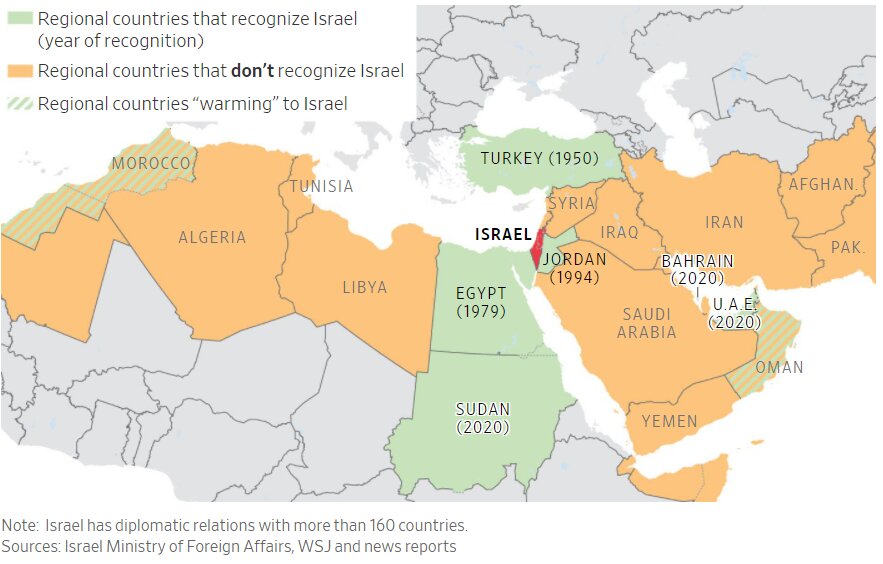International Relations
Sudan and Israel to Normalise Relations
- 27 Oct 2020
- 4 min read
Why in News
Recently, in a deal brokered by the USA, Sudan and Israel have agreed to normalise relations to end decades of hostility.
Key Points
- Sudan, which was technically at war with Israel since its foundation in 1948, has now become the third country to forge diplomatic relations with it, in recent times.
- Earlier, the USA brokered diplomatic pacts between Israel and the UAE and Bahrain as well, to normalise their relations.
- Implications:
- The deal would deepen Sudan’s engagement with the West.
- The deal follows USA’s conditional agreement to remove Sudan from its blacklist of countries accused of sponsoring terrorism.
- Sudan was added to the list in 1993 after it was accused of harbouring groups such as Hezbollah and Palestinian militant outfits which the USA deems as terrorists.
- As a result, Sudan was cut off from the global economy and was starved of foreign investment which faced another blow in 2011 when South Sudan was formed taking away its major oil resources.
- With its name removed from the list, Sudan will no longer stay deprived of foreign investments.
- Under the deal, Sudan has agreed to pay USD 335 million in compensation to victims of the Al-Qaeda bombings of USA embassies in Kenya and Tanzania in 1998.
- It delivers a foreign policy achievement for Trump just days before the USA election.
- It boosts Israel’s motive which has made it a priority to forge ties with formerly hostile countries in Africa and the Arab world in the absence of any progress with the Palestinians.
- In the initial phase, there will be no exchange of ambassadors or a mutual establishment of embassies.
- After the six-day war of 1967 war, Arab powers met in Khartoum (Sudan’s capital) to pledge three “noes” viz. no peace with Israel, no recognition of Israel, and no negotiations with Israel. Therefore, the deal holds a symbolic significance for Israel.
- Unlike the UAE and Bahrain, which have never fought with Israel, Sudan sent forces to fight in the war around Israel’s creation in 1948 and during the war of 1967. In the 1970s, Israel backed Sudanese insurgents fighting the Khartoum government.
- With this agreement, Israel will complete the creation of a safety cordon in the Red Sea, which currently includes Egypt, Jordan, South Sudan and Saudi Arabia.
- The deal is also aimed at unifying Arab countries against their common adversary, Iran.
- Though Sudan has been largely marginal to Middle Eastern politics in recent decades, the normalisation has significant symbolic value.
- Global Reaction:
- Allies of the USA, including Germany, Egypt, the UAE, Bahrain, have welcomed the deal as a boost to stability in West Asia.
- Meanwhile, Palestinian leaders have strongly condemned the deal, echoing their rejection of all of the Israel’s normalisation accords.





